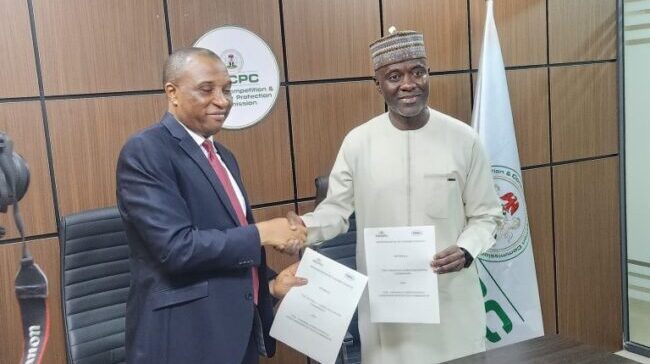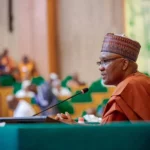•signs MoU to protect consumers’ right
In a bid to streamline the operation of the telecoms industry and also adequately protect the rights of consumers in the country, the Federal Competition and Consumer Protection Commission (FCCPC) entered into a partnership with the Nigerian Communications Commission (NCC) to ensure speedy growth of the sector.
Speaking on Tuesday while welcoming the team from NCC to his, the Executive Vice Chairman of FCCPC, Mr. Tunji Bello
explained that by design, regulations are often interwoven and overlapping.
“The principle behind overlapping regulations is simple: it serves as a mechanism to prevent issues from slipping through the cracks.
“This explains the interwoven relationship between the Federal Competition and Consumer Protection Commission (FCCPC) and the Nigerian Communications Commission (NCC).
“It ensures that if one agency, due to certain limitations, fails to identify or address a consumer issue or regulatory violation, the other agency, potentially with a different perspective, will be able to step in effectively.
“This highlights the importance of Section 105 of the Federal Competition and Consumer Protection Act (FCCPA) 2018, which explicitly provides for cooperation and collaboration between the FCCPC and sector regulators.”
Bello stated that “this synergy is critical to ensuring comprehensive oversight and consumer protection without regulatory conflicts or duplications.
“By this, we are also making life easier for the generality of consumers in dealing with two government agencies on the same issue at the same time.
“The signing of this MoU today symbolises the convergence of two diligent government agencies in compliance with legal requirements to eliminate regulatory gaps in the telecoms industry.”
He said the journey to this milestone has been both challenging and rewarding. “I am pleased that with Dr Aminu Maida, the Executive Vice Chairman and Chief Executive Officer of the NCC, we have successfully achieved this milestone.
“Guided by our shared vision, this partnership will benefit both operators and consumers. It will foster harmonious collaboration between our organisations, streamline operations for telecom operators through a one-stop-shop approach in many instances, and ensure robust consumer protection, fair competition, and the eradication of exploitative practices.
“Given the importance of this legal requirement, today’s event should inspire other sector regulators to establish similar collaborative frameworks with the FCCPC, as mandated by Section 105 of the FCCPA. This will ensure that consumers across all sectors enjoy the benefits of coordinated and comprehensive regulatory oversight,” the EVC noted.
In his address, the Executive Vice Chairman of NCC, Dr Aminu Maida said, “this occasion is one that I would describe as long coming. It is the outcome of healthy engagements and events that have strengthened the resolve of both our institutions to protect the Nigerian consumer, especially in the communications industry.
“Today, we celebrate the beginning of a strategic partnership between two critical regulatory institutions, each committed to advancing the welfare of the Nigerian people through fair competition and robust consumer protection frameworks” he stated.
The EVC further emphasized that in an era of rapid technological advancements, the significance of collaboration between regulatory bodies cannot be overstated. “The telecommunications sector, in particular, has become the cornerstone of Nigeria’s economic and social development.
“This makes it imperative that we ensure a level playing field for all stakeholders while protecting consumers who depend on reliable and affordable communications services.
“By aligning our efforts, the NCC and FCCPC aim to avoid regulatory uncertainty and create clarity for the benefit of all stakeholders in the communications sector and in furtherance of their joint responsibility to ensure the realization of the Federal Government’s Ease of Doing Business objectives.
“Our partnership also highlights the importance of synergy in regulatory oversight. The challenges we face today—whether they relate to market abuses, consumer rights violations, or the complexities of a digital economy—demand a united front and a consistent approach to policy implementation.
“This MoU will ensure that our respective mandates are harmonized to achieve maximum impact” Maida stated.
ALSO READ FROM NIGERIAN TRIBUNE






